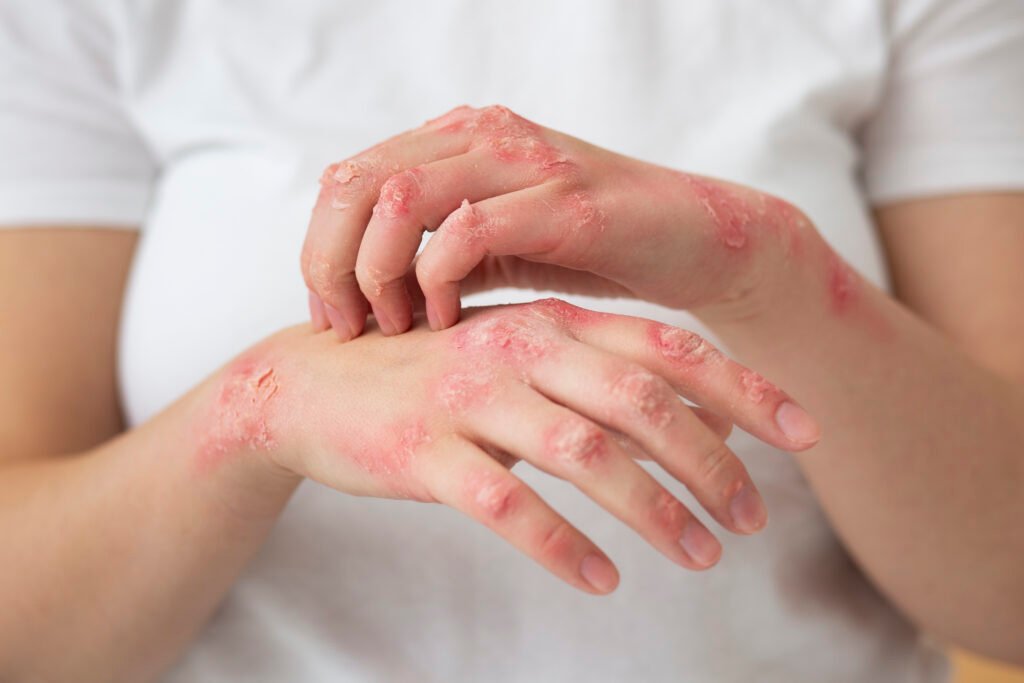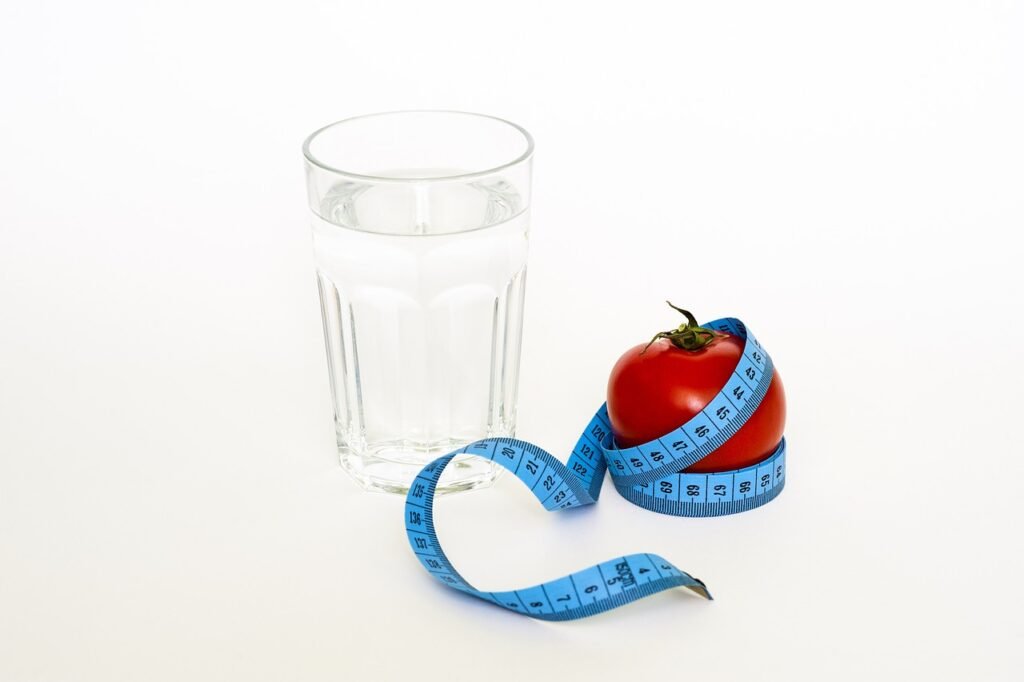Are you experiencing inflammation of the skin accompanied by vesicles or pustules? You might be dealing with eczema, a common and troublesome skin condition. Let’s delve into the details of eczema, including its symptoms, causes, and effective natural remedies.
1. What is Eczema?
Eczema, derived from a Greek word meaning to boil, refers to inflammation of the skin characterized by the formation of vesicles or pustules. It is the most common and troublesome of all skin diseases, presenting various chronic forms.
What Causes Allergic Eczema?
Allergic eczema arises when the skin encounters an allergen, leading to a delayed allergic reaction. Common triggers include nickel, perfumes, clothing dyes, latex, and certain chemicals found in cosmetics and cleaning products. Exposure to sunlight alongside specific substances, like sunscreen, can also induce allergic eczema.
Recognizing Symptoms
Symptoms of allergic eczema vary but often include itching, burning sensation, red bumps, tender skin, dryness, inflammation, and rash. These symptoms typically manifest at the site of allergen contact and may spread in rare cases.
Diagnosis Methods
Diagnosing allergic eczema involves a thorough examination by a healthcare professional. Patch testing, where allergen-containing patches are applied to the skin for 48 hours, is commonly used. Additionally, skin lesion biopsy may be performed to rule out other skin conditions and confirm the diagnosis.
Treatment Approaches
Treatment strategies for allergic eczema depend on symptom severity. Basic care involves thorough washing of the affected area to remove allergen traces. Moisturizing creams aid in hydration and skin repair, while over-the-counter corticosteroid creams alleviate itching and inflammation. Severe cases may require prescription-strength medications, including corticosteroid pills.
Long-Term Outlook
With proper treatment, allergic eczema typically resolves within two to three weeks. However, recurrence is possible upon re-exposure to the allergen. Identifying and avoiding the triggering allergen is crucial for preventing future flare-ups.
For more information on allergic eczema and related topics, consult a healthcare professional or explore reputable medical resources.

2. Symptoms of Eczema
In its acute form, eczema manifests as redness, swelling, and the formation of minute vesicles accompanied by severe heat. The affected skin may become raw and moist, with oozing discharge leading to crust formation. Itching is a common symptom, particularly worsened at night.
3. Causes of Eczema
Allergies, faulty metabolism, constipation, nutritional deficiencies, and stress are key factors contributing to eczema. Allergens from substances like soaps, metals in jewelry, and certain foods can trigger eczema. The accumulation of toxins in the body also plays a crucial role in its development.
4. The Importance of Detoxification
Proper detoxification of the body is vital to eliminate waste matter and restore skin health. Fasting and dietary adjustments are effective strategies to cleanse the bloodstream and promote healing.
5. Fasting for Eczema Relief
Initiating a fast on orange juice and water for five to ten days can aid in eliminating toxic waste from the body and improve eczema symptoms. Although symptoms may initially worsen due to increased waste elimination, fasting gradually leads to improvement.

6. Dietary Recommendations
After fasting, a diet comprising fruits, salt-free vegetables, whole grains, and nuts is beneficial for eczema patients. Foods like carrots and musk melon are particularly helpful. Avoiding processed foods, refined sugars, and inflammatory ingredients is essential for managing eczema.
7. Benefits of Raw Vegetable Juices
Raw vegetable juices, especially a combination of carrot and spinach juice, provide essential nutrients and promote skin health. Regular consumption of raw juices aids in detoxification and supports the body’s healing process.
8. Lifestyle Modifications
In addition to dietary changes, lifestyle modifications such as avoiding restrictive clothing, staying hydrated, and practicing regular physical activity are crucial for managing eczema. Coconut oil application and sunbathing can also provide relief.
9. Water Treatments
Cold compresses or wet fomentations are beneficial for acute eczema. Applying cold water-soaked cloths to the affected area helps alleviate itching and inflammation. Water treatments should be applied consistently for optimal results.
10. Conclusion
Skin applications to cure cerema may give temporary relief.
Suppression of the exudation may lead to the development of another, more serious illness. The best course of action for treating eezema is to detoxify the body and bloodstream.
The treatment should start with a fast on organic orange juice and water from five to 10 days, depending on the severity and duration of the trouble. Mix fruit Juice fasting’s will support eliminate bad toxic waste’s from body and lead to important improvement. In some cases, the condition may worsen in the beginning of the fast due to the increased elimination of waste matter through the skin. But fast continue in development will clear itself.
Mix Fruits, sodium-free, organic raw or steamed vegetable with whole multigrain bread or chappati may be grasp after the mix fruit and vegitable juice fast. Carrot and musk melon are particularly beneficial. Original Coconut oil can be used instead of ghee. After a few days, curd and milk may be added to the diet. The patients may thereafter gradually embarkupon a well-balanced diet of three basic food groups, namely @ soods nuts and grains, (i) vegetables and (i) fruits. The lange proportion of the diet should consist of raw foods. Sceds and beans such as alfalfa, mung and soyabeans can be sprouted.
In chronic and more difficult cases of eezema, the patient should fast at least once a week till he is cured.
The patient should avoid tea, coffee, alcoholic beverages and all condiments and highly flavoured dishes. He should also avoid sugar, white flour products, denaturated cereals like polished rice and pearled barley and tinned or bottled foods.
He should eat only pure and wholesome foods.
Raw vegetable juices have shown great promise in the treatment of eczema, particularly when combined with spinach juice and carrot juice. Carrots (300 ml) and spinach (200 ml) are the formula proportions that are thought to be useful in this combination to make 500 ml, or half a litre, of juice.
The patient should get as much fresh air as possible.
Restrictive clothing should not be worn. Two or three litres of water should be taken daily and the patient must bathe twice or thrice a day. The skin, with the exception of the parts affected with eczema, should be vigorously rubbed with the palms of the hands before taking a bath.
Organic Coconut oil may be empirical to the section with eczema.
It will help the skin to stay soft. Walking or jogging should be resorted to in order to activate the bowels. Sunbathing is also beneficial as it kills the harmful bacteria and should be resorted to early in the morning, in the first light of dawn. Applying a thin layer of mud to the eczema spots can also be beneficial.Applying the pack should be done twice or three times a day for an hour at a time.
Water Treatment
Cold compresses or cold wet fomentations are helpful in cases of acute eczema. The affected part should be wrapped with a thick soft cloth. The cloth should be moistened with cold water (55°-60°F) every 15 to 30 minutes for two hours at a time. The bandage should be left intact, keeping the cloth cold. There may be intensification of itching or pain initially but this will soon subside. A cold compress may be applied twice daily for a week or so.

11. FAQs about Eczema
Q1. What are the common triggers for eczema? A1. Common triggers include allergies to substances like soaps, metals, and certain foods, as well as stress and toxins in the body.
Q2. How does fasting help in managing eczema? A2. Fasting aids in detoxifying the body and eliminating waste matter, leading to improved skin health and reduced inflammation.
Q3. Are there any dietary recommendations for eczema? A3. Yes, consuming a diet rich in fruits, vegetables, whole grains, and nuts, while avoiding processed foods and refined sugars, is beneficial for eczema management.
Q4. Can lifestyle modifications help with eczema? A4. Yes, lifestyle changes such as avoiding restrictive clothing, staying hydrated, and practicing regular physical activity can contribute to managing eczema symptoms.
Q5. What are the benefits of water treatments for eczema? A5. Water treatments like cold compresses help alleviate itching and inflammation associated with acute eczema, providing relief and promoting skin healing.